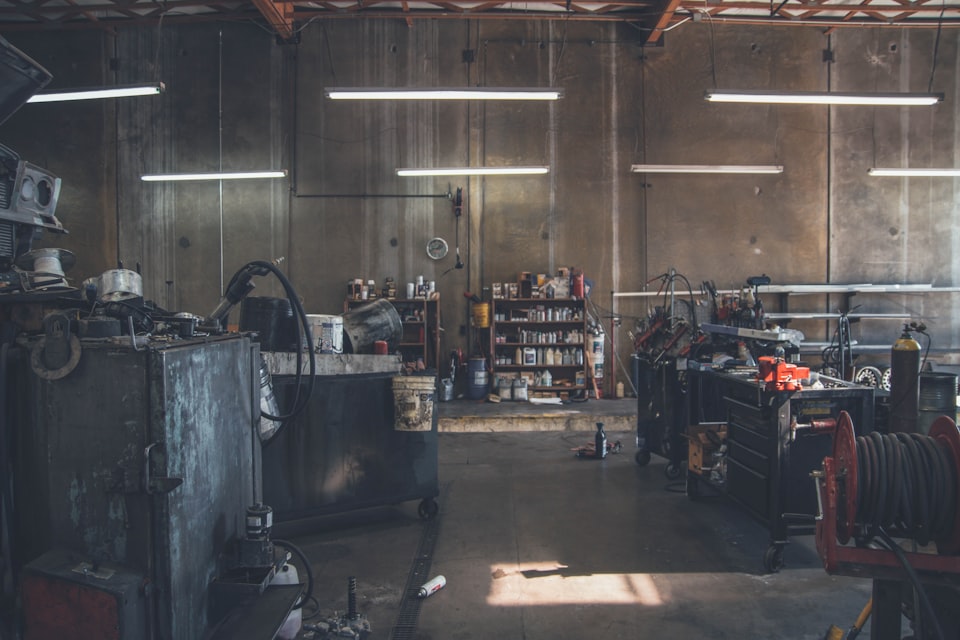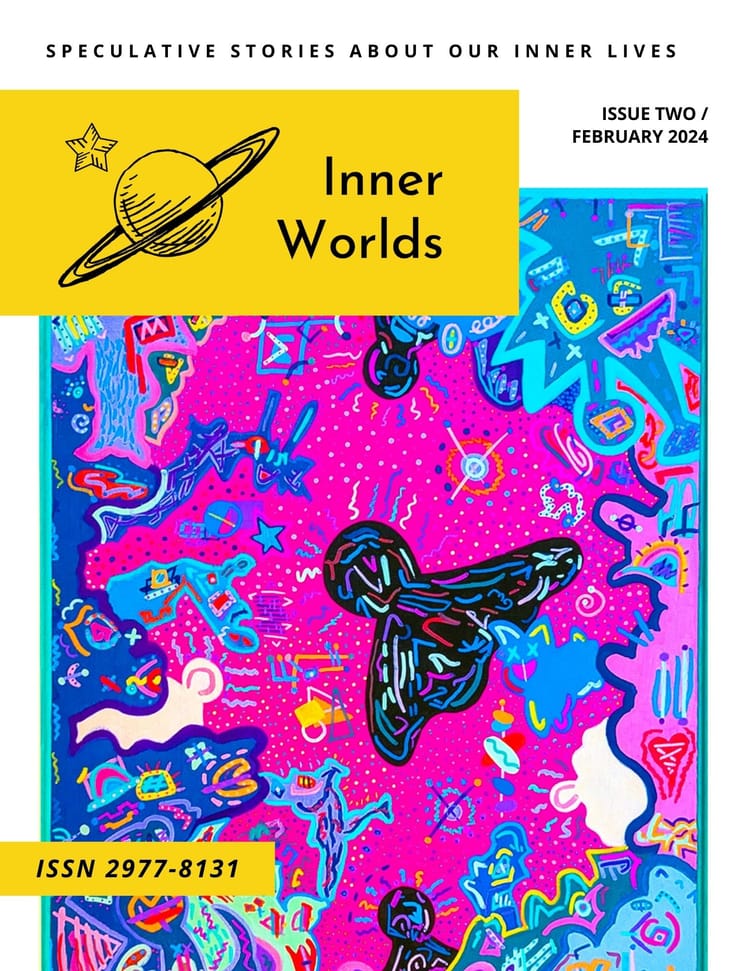The Long Hauler's Garage, by Chad Gayle

Content warnings
Death. Grief.
The shuttle dropped us at a fenced-in pad on Third Avenue and jumped up to take an ugly bite out of the sky. My ears buzzed like a second hand cockpit cage on liftoff as I glanced at Sills, whom I’d met the night before at a long hauler’s lounge.
“I can do eight gees standing on my head, but those AI-powered buzzards sure get me shook up.”
Sills shielded her eyes against the glare of the sun. “Being hungover certainly doesn’t help,” she said. “Where is this place?”
“This way.”
We found the sidewalk and followed it up Third. I was taking her to Ephraim’s garage, one of the three remaining garages in Newport that still worked on pre-fusion propulsion systems.
Having graduated from the ranks of small freight roughly sixteen months before, I’d just returned from my first trip to the Oort Cloud. Eleven months at near light speed to deliver parts and supplies to the jump gate being built off the plane of the ecliptic. All I wanted after I’d landed, of course, was a taste of my old life, the life of a long hauler, and that was how I’d met Sills. She had a lease on a class II cargo ship with a stubborn coolant leak that wouldn’t stay fixed, and after we’d finished swapping war stories and lamenting the new tolls on the Moon-Mars shipping lanes, I mentioned my pal Ephraim and sang his praises, emphasizing his quick turnaround on repairs. Sills was sold on the idea of paying him a visit as soon as I mentioned pre-fusion propulsion, and she showed her thanks by buying me one too many drinks, which I’d unwisely said yes too.
As bad as a hangover can be in freefall, in Newport’s swampy, equatorial heat, it’s particularly painful; what I needed was some coffee, which I could get from Pascale’s coffee cart as soon as we arrived at the garage.
Whenever I dropped off a bad module at Ephraim’s, Pascale’s coffee cart was parked at the curb, and while I waited for Ephraim to finish his business with another customer, I would buy a café con leche from Pascale, a tall, lean-limbed fellow who’d been born on the Moon but had later emigrated to Cuba. We would chat a bit about how the neighborhood was changing and then Ephraim would call me over with a comment angled at Pascale, something like “Don’t drink that stuff—it’s made from leeches!” To which Pascale would reply with a sneer, “It’s con leche, you dope! Leche means milk,” a remark he would pair with a rude gesture he aimed at Ephraim. Ephraim would laugh and I would make my way between engine blocks and exhaust cones strapped to huge palettes to meet him at the mouth of one of the garage’s three open bays, where he would shake my hand and say “So good to see you, my friend,” as if he’d thought we would never meet again.
After he’d told me what needed to be fixed, we would haggle over the dollars and cents and I would throw in how hard it was to make a living hauling small freight using sluggish pre-fusion propulsion engines, and that was usually when Pascale wandered over to wade into the conversation, which would get the two of them started in on how harmful this or that regulation was to the space industry. They quickly spun up a cloud of complaints that made the sky look dark and gloomy, posing such a bleak outlook for us all that it always came as something of a surprise when they slipped right back into their bait and switch bantering, kidding each other all over again. By that point, my cup was empty, and the café con leche was gone.
Thinking about that song and dance while I walked with Sills past those broken down streets that branched off of Third Ave, I wondered how she would react to Ephraim and Pascale’s antics. When their discussion grew heated, would she feel compelled to make a quick exit, or would she jump right in, playing devil’s advocate? Maybe nothing they tossed at each other would bother her, I thought; maybe she wouldn’t notice their back and forth at all.
I worried about this more than I should have. The truth is, I wanted Sills to pick up where I’d left off; on my last visit to Ephraim’s place, I’d come in to get a clean bill of health on my Nexus Procyon before I put it up on the auction block. When I said so long and good luck, the sadness in Ephraim’s eyes was easy to see, and I was hoping that bringing in some new blood would show him that I hadn’t forgotten the times we’d spent together sweating on the apron of concrete in front of his garage.
Sills tapped my shoulder to get my attention. “You said it’s on a hundred and thirty-seventh?” she asked.
I looked around. That’s where we were—Third Avenue and 137th Street—but instead of standing next to Ephraim’s garage, we’d come up on a big glass box, a fifteen or twenty story building filled with luxury apartments.
“What the hell?”
The building was practically brand new. Tilting my head back, I saw people moving behind the plate glass windows, but this didn’t make any sense; I didn’t understand how the tower could have sprung up so fast. Spinning around, I scanned the signs lining the other side of the street, which looked dingier and dirtier than I’d remembered them to be, and then I saw Pascale. His cart was set up outside of a laundromat; he didn’t budge when I shouted his name.
“Come on,” I told Sills.
She followed me across the street. My throat felt as if it was lined with fur, but I put on my warmest smile as I approached Pascale.
“What happened to the garage?” I asked. “Where’s Ephraim?”
Understanding dawned in the Moon man’s eyes, an understanding that was interwoven with grief. “You were one of his customers?”
“For many years, yes. Where’d he go? Did he finally sell the place?”
Pascale tipped his head deferentially toward Sills, and I noticed how much older he looked; deep wrinkles crossed his forehead, and his black hair was dusted with gray. Then I remembered what my drinking bout with Sills—and the accompanying hangover—had blotted out: the time stretch tied to my trip to the Oort Cloud. At near light, eleven months out and back added up to more than five years on Earth.
The grief that had flashed in Pascale’s eyes suddenly made sense. I asked him how Ephraim had died. He told me it was a heart attack.
“He always worked too hard,” Pascale added.
“He had a family, didn’t he?”
“Yes. A wife and two children.”
I stared at this older, more sedate version of Pascale for a moment before I turned away. Without thinking about where I was going, I tramped across the cracked and torn sidewalk along Third Avenue, and it seemed as if the dark brown brick facades lining the street were leaning towards me, as if they were about to bury me under a pile of rubble. A chill raised the hair on my scalp in spite of the thick heat I had to swim through; I stumbled and nearly fell, and when I righted myself, I was sure that I could feel the world turning under my feet.
I looked around for signs of something familiar, of landmarks I could place in the where and the when I occupied, and then I found myself imagining the future changes that would assail the city, the high-rises that would blink in and out of existence like something from a stop motion picture as time stretched and snapped back over and over again. When I reached the next corner, I had to rest against the glass face of a bus stop to get a grip; I was exhausted, empty and spent in a way that I’d never been before. I heard Sills call my name.
She looked blurry at first, as if she wasn’t really there at all, but then she came into focus, and I could see the kindness and the concern in her eyes.
“I’m so sorry,” she said as she rested her hand on my shoulder. “You were close, weren’t you—you and Ephraim?”
The five year contract I’d just signed—four more trips to the Oort Cloud and back—flashed in my mind like a falling star while I wiped away my tears and shook my head.
“No, I hardly knew him,” I said. “I hardly knew him at all.”
A moment later, I offered Sills a sheepish grin and a slap on the back, and we started for the landing pad where we’d been dropped so we could catch the shuttle that would take her home.
Chad Gayle
Chad Gayle’s science fiction has appeared in Andromeda Spaceways Magazine, MetaStellar, and The Colored Lens. Proud father to two humans and three felines, he’s also an avid roller skater and a fan of the many incarnations of Star Trek, both old and new.
- Website: https://chadgayle.com/
- BlueSky: @chadgayle.bsky.social
- Mastodon: @ChadGayle@wandering.shop
- Instagram: @chadgayle





Member discussion